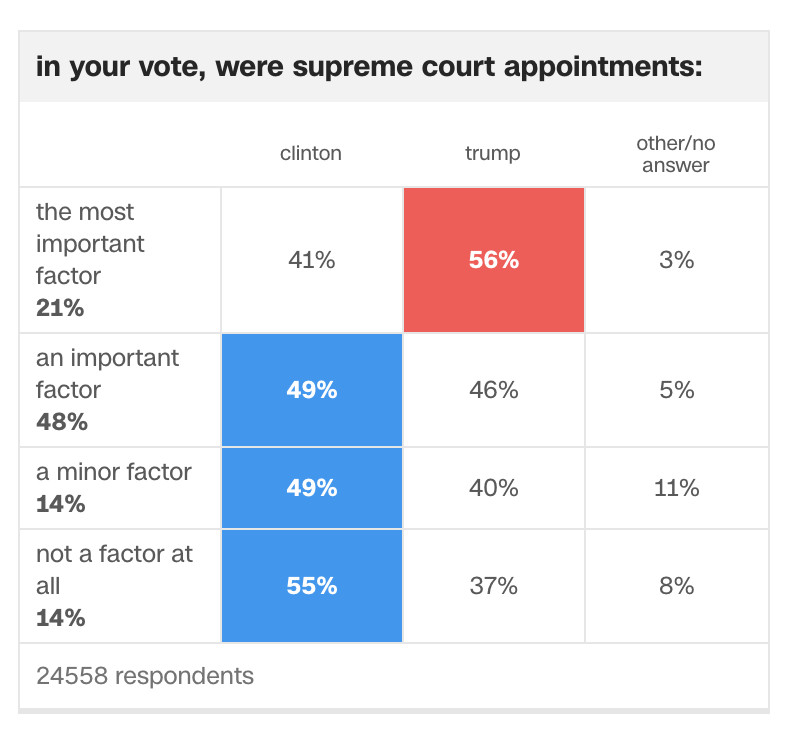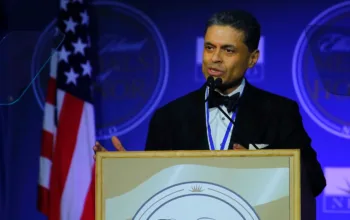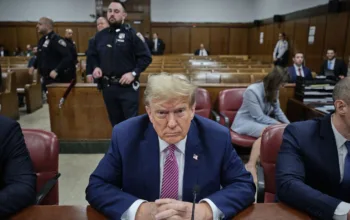
They’re about to get exactly what they want.
One of the most underappreciated reasons that Donald Trump won the 2016 election was voters motivated by a vacancy on the Supreme Court.
One in five voters told CNN in an exit poll that the Supreme Court was one reason they had cast a ballot. Of the voters who said it was the “most important factor” in their decision, 56 percent voted for Trump. According to the Washington Post, 26 percent of all Trump voters polled said that the Supreme Court was the basis of their decision.

Anthony Kennedy’s retirement confirms what Republican voters knew two years ago: Sending a Republican to the White House could make a huge difference in the makeup of the court for a generation.
Now, with Trump’s approval ratings continuing to flag and the tax plan the GOP had plan to run on in the midterms losing popularity, Republicans are glad to have a new talking point for 2018: They’re promised a conservative court. And they’re going to deliver.
Kennedy has made the Supreme Court a campaign slogan — again
Already, Kennedy’s exit has ratcheted up for the 2018 midterms. Republican strategists plan to make it an issue.
Dawson Schefter, the chief of staff for the North Dakota Republican Party, told me: “There is no question that a vacancy on the Supreme Court will drive North Dakota Republicans to the polls in November. … North Dakotans need a reliable vote for a conservative justice in the US Senate and they know Kevin Cramer to be just that.” Kevin Cramer is running against North Dakota Senator Heidi Heitkamp, one of four Democrats in the Senate representing states Trump won in 2016 by more than 10 points.
Indiana Republican Party Chair Kyle Hupfer released a statement Wednesday that pointed directly to the Supreme Court as a motivation for conservatives to vote Republican in November. He referenced Sen. Joe Donnelly, who beat Republican Richard Murdock in 2012 after Murdock said that when a baby is conceived during rape “that is something that God intended to happen.” Donnelly is considered one of the most vulnerable Democrats in Congress.
Hupfer said in the statement:
“No matter when this vote ultimately takes place, today’s news changes the November equation by putting added pressure on Democrat Joe Donnelly and increasing the importance of electing Mike Braun, a proven conservative ally of President Trump, to the United States Senate….“Who knows what Democrat Donnelly will do if he’s faced with this confirmation vote. But we know, for sure, what Mike Braun will do. He will always stand with President Trump. And that’s why we need him in the Senate.”
This isn’t the first time the GOP has used the Court as a campaign banner. After the death of conservative Justice Antonin Scalia, the Court was such an important issue for conservatives that Trump’s Republican opponents in the primary, like Sen. Ted Cruz, used it as a cudgel against Trump, arguing that he wouldn’t nominate conservative justices.
In February 2016, Cruz said on This Week that Trump “does not care about conservative justices on the court” and added:
“Far too many Republicans don’t care about the court, don’t invest political capital in it. And it’s why so many Republican nominees have turned out to be disasters…Justice Scalia, one of his biggest opinions was the “Heller” decision. It was 5-4, upholding the individual right to keep and bear arms. If an additional liberal justice goes to the court, we’re one justice away from the Second Amendment being written out. And if Donald Trump becomes president, the Second Amendment will be written out of the Constitution because it is abundantly clear that Donald Trump is not a conservative.”
But Trump himself recognized the importance of the Supreme Court in the mental calculus of Republican voters, and he used it to shore up support and win the nomination.
In March 2016, when some Republicans debated throwing their support behind a third-party candidate, Trump responded by saying:
“If they want to embrace this, that’s great. And let me tell you, if they don’t win, they’re going to have probably four, and could even be five, Supreme Court justices approved that will never allow this country to be the same. It’ll take 100 years, but that won’t work. So they better be careful.”
Trump appears poised to tap a conservative
To settle the worries of conservative voters during the campaign, Trump released a list of possible Supreme Court picks in May 2016, a list he said was “representative of the kind of constitutional principles I value.” (The National Review wrote then that it was “cautiously optimistic” about his selections.)
But Trump went further. He mentioned the Supreme Court during his Republican National Convention speech accepting the nomination for president: “We are also going to appoint justices to the United States Supreme Court who will uphold our laws and our Constitution.”
During campaign speeches in the fall of 2016, he made the opportunity to get a conservative justice (or two) on the Supreme Court a touchstone of his argument for his presidency. In Waukesha, Wisconsin, Trump told a crowd of supporters, “Don’t let it slip away. We have one chance. This is it. We don’t have four more years. We don’t have four more years. They’ll start appointing justices of the Supreme Court. Remember that, Supreme Court — we lost a great one, Judge Scalia. We can’t let it slip away.”
Conservatives and independents agreed, and many voted for Trump with the Supreme Court in mind. In an email, Hupfer, the Indiana GOP chair, said that the Supreme Court helped get Indianans behind Trump in 2016. “The Supreme Court played a significant role in Hoosiers selecting Donald Trump,” he said. “We knew that the next president would likely nominate two or more justices, and only one candidate, Donald Trump, would choose solid conservatives to occupy the bench.”
In July 2016, conservative commentator Hugh Hewitt wrote (in an article titled “It’s the Supreme Court, Stupid”) that his decision to vote for Trump was based largely on the potential repercussions of a Hillary Clinton presidency on the Court.
If Hillary Clinton wins, the Left gavels in a solid, lasting, almost certainly permanent majority on the Supreme Court. Every political issue has a theoretical path to SCOTUS, and only self-imposed judicial restraint has checked the Court’s appetite and reach for two centuries. That restraint will be gone when HRC’s first appointee is sworn in. Finished. So vote for Hillary Clinton (or sit it out) and then prepare for the deluge of court-ordered solutions to every social problem, bench-drawn congressional districts and extraordinary deference to every agency of the federal government combined with a sweeping away of federalism.
In October 2016, Manny Klausner, a libertarian and co-founder of the Reason Foundation, said that he was voting for the Libertarian Party candidate, Gary Johnson, but added that for other libertarians, “the likelihood that the next president will nominate several Supreme Court justices in the next four years is reason enough for voters in battleground states to vote for Trump — rather than Johnson — if their state is a cliffhanger on the eve of the election.”
In 2018, it’ll be a version of that same list, the one released during the 2016 campaign, that Trump uses to make his choice this summer — full of conservative heavy hitters with close ties to both right-leaning legal organizations and Republican members of Congress.
The most recent Supreme Court term, with cases focusing on unions, religious freedom, and Trump’s travel ban, showed that conservatives were correct to focus so intensely on the Supreme Court. According to the New York Times, Justice Neil Gorsuch — nominated by Trump — was the deciding vote in 15 of the 18 cases decided by a 5-to-4 vote. In 14 of those, he voted with the Court’s conservative wing.
Abortion was the hot-button issue for Supreme Court voters
Among the Supreme Court issues that pushed voters towards Trump: abortion. In June 2016, Trump met with evangelical Christian leaders in New York, and Trump told the group that his potential Supreme Court nominees “will be great intellects, talented men at what they do — and women — but also be pro-life.” He added, “If Hillary gets in … we know exactly what’s gonna happen. We’re gonna end up being a different country … a Venezuela.”
That remark had a powerful impact on pro-life groups. Marjorie Dannenfelser, president of the Susan B. Anthony List, an organization opposed to legalized abortion, told NBC News, “When he said several times today ‘pro-life Supreme Court justice’ — that’s the first time I’ve ever heard a candidate use those words together in one sentence.” That was a major shift for Dannenfelser, who had earlier that year joined other anti-abortion activists in furiously rejecting comments Trump made arguing that women who have abortions should be “punished.”
Read More
https://cdn.vox-cdn.com/community_logos/52517/voxv.png


